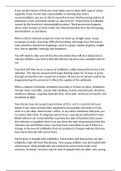If you are the owner of bird you must make sure to clean their cage or aviary
regularly. If you do not take responsibility in cleaning your bird’s
accommodation, you are at risk of yourself and your bird becoming victims of
psittacosis, more commonly known as ‘parrot fever’. Parrot fever is a disease
caused by the bacterium chlamydophila psittaci. The transmission happens
when other humans or birds inhale the infected bacteria from bird droppings,
shed feathers, or secretions.
When a bird is infected symptoms may not show up straight away. Some
symptoms include: shivering, difficulty breathing, discharge from the eyes or
nose, diarrhea, discolored droppings, urine in various shades of green, weight
loss, loss of appetite, lethargy and sleepiness.
You will need to take your bird to the vets where they will do a blood test to
indicate whether your bird is infected with the bacteria and a possible chest X-
ray.
Your bird will then be on a course of antibiotics called doxycycline to treat the
infection. This may be consumed through drinking water for 45 days or given
through an injection one a week for 6 weeks. All sources of calcium need to be
stopped during this period as it affects the uptake of the antibiotic.
When a human is infected, symptoms may take 4-19 days to show. Symptoms
include: fever and chills, nausea and vomiting, muscle and joint pain, diarrhea,
weakness, fatigue, coughing (typically dry), chest pain, shortness of breath, and
sensitivity to light.
Your doctor may not suspect parrot fever at first, so it is crucial to tell your
doctor if you have recently been exposed to any possibly sick birds or if you
work in a pet shop, veterinarian’s office, or any other workplace that puts you
in contact with birds. To diagnose parrot fever, your doctor will perform tests.
Blood cultures can reveal whether you have the type of bacteria that causes
this infection. A possible chest X-ray can show the type of pneumonia that this
infection can sometimes cause. You may have a test done to see if there is a
change in the level of antibodies that are produced. Changes indicate that you
have been infected with parrot fever.
Parrot fever is treated with antibiotics. Tetracycline and doxycycline are two
antibiotics that will treat this disease. Very young children may be treated with
azithromycin. Most people who are treated for parrot fever make a full
recovery. However, recovery may be slow in people who are older, very young,




